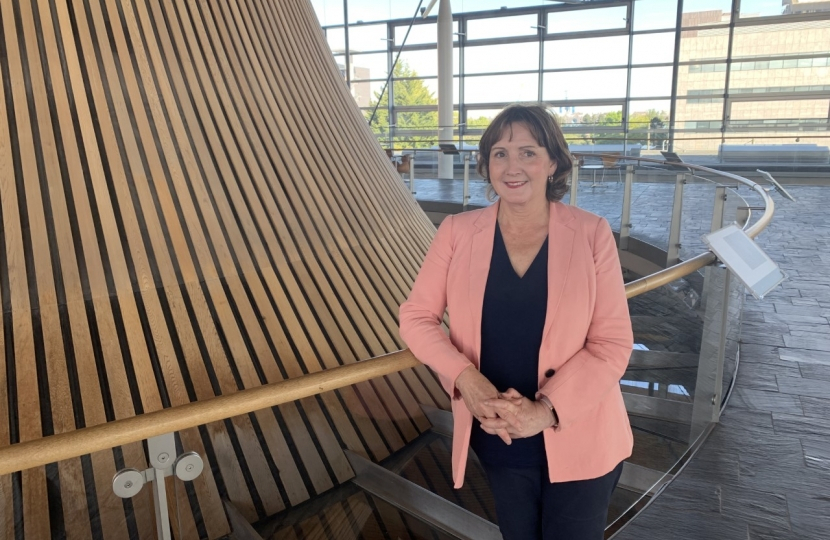
Janet Finch-Saunders, Member of the Welsh Parliament for Aberconwy, has spoken out in the Welsh Parliament about the need for the waiting times for cancer treatment to be cut.
According to the latest data, only 58% of patients in Betsi Cadwaladr University Health Board started their first definitive treatment in the month within 62 days of first being suspected of cancer. That is worse than the previous month.
During her contribution, the Member for Aberconwy gave example of cases where constituents have been waiting months for treatment, have sadly passed away before receiving treatment, and experienced delays because care needed to be transferred to hospitals in England.
Speaking after addressing the Minister for Health and Social Services, Janet said:
“It cannot be right that only around half of cancer patients in North Wales are starting treatment within the target period.
“Richard Pugh, Macmillan Cancer Support Wales, was sadly right when he stated that cancer treatment in Wales now rests firmly on the flip of a coin – people with cancer face no better than 50-50 odds on whether they are treated on time.
“Many patients in Betsi Cadwaladr require specialist treatment in England, but there are delays in transferring patients to access the services there.
“Whilst I acknowledge the fact that the Minister is trying to improve diagnostics, more needs to be done to ensure that residents who have already been diagnosed with cancer receive the treatment they require within the target at whichever medical centre is most adequately suited to provide the care required.”
ENDS
Mae Janet Finch-Saunders, Aelod o’r Senedd dros Aberconwy, wedi codi llais yn y Senedd am yr angen i gwtogi amseroedd aros am driniaeth canser.
Yn ôl y data diweddaraf, dim ond 58% o gleifion Bwrdd Iechyd Prifysgol Betsi Cadwaladr ddechreuodd eu triniaeth gyntaf yn y mis o fewn 62 diwrnod i ganser gael ei amau gyntaf. Mae hynny'n waeth na'r mis blaenorol.
Yn ystod ei chyfraniad, rhoddodd yr Aelod dros Aberconwy enghraifft o achosion lle mae etholwyr wedi bod yn aros misoedd am driniaeth, wedi marw cyn derbyn triniaeth, a phrofi oedi oherwydd bod angen trosglwyddo gofal i ysbytai yn Lloegr.
Wrth siarad ar ôl annerch y Gweinidog Iechyd a Gwasanaethau Cymdeithasol, dywedodd Janet:
“Ni all fod yn iawn mai dim ond tua hanner y cleifion canser yn y Gogledd sy'n dechrau triniaeth o fewn y cyfnod targed.
“Yn anffodus, roedd Richard Pugh, Cymorth Canser Macmillan Cymru, yn llygaid ei le pan ddywedodd fod triniaeth canser yng Nghymru yn dibynnu’n llwyr ar lwc bellach – mae pobl â chanser yn wynebu posibilrwydd sydd dim gwell na 50-50 o gael eu trin ar amser.
“Mae llawer o gleifion yn Betsi Cadwaladr angen triniaeth arbenigol yn Lloegr, ond mae oedi wrth drosglwyddo cleifion i gael mynediad at wasanaethau yno.
“Er fy mod yn cydnabod y ffaith bod y Gweinidog yn ceisio gwella diagnosteg, mae angen gwneud mwy i sicrhau bod preswylwyr sydd eisoes wedi cael diagnosis o ganser yn cael y driniaeth sydd ei hangen arnyn nhw o fewn y targed ym mha bynnag ganolfan feddygol sydd fwyaf addas ar gyfer darparu'r gofal sydd ei angen.”
DIWEDD

